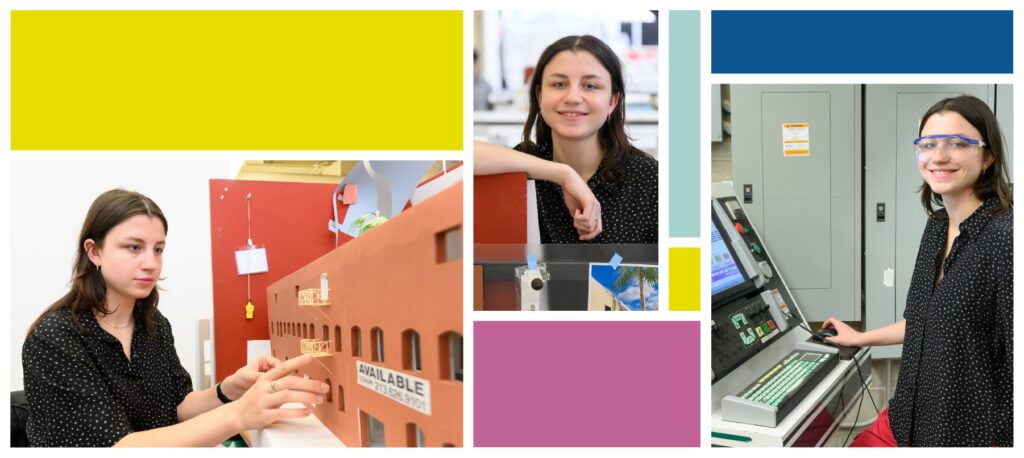Student Story: Maggie Musante MArch I ’24
 “Winning the Cossutta Prize helped my financial situation immensely, and my work and school performance have benefited. On top of that, I felt like I was affirmed for the work I had done these past two years. It made me much more confident as a designer.”
“Winning the Cossutta Prize helped my financial situation immensely, and my work and school performance have benefited. On top of that, I felt like I was affirmed for the work I had done these past two years. It made me much more confident as a designer.”
—Maggie Musante MArch I ’24
________
Maggie’s journey to the GSD was a non-traditional one. She attended Oberlin College, where she earned a bachelor of arts in environmental studies. In her undergraduate years she focused on sustainable urbanism, exploring how designed spaces can become catalysts for positive change in the world. She found purpose in design, seeing it as a solutions-based approach to the often disheartening realities of the current environment.
“I was figuring out what I wanted to do and seeing if architecture was the right path for that. Architecture allows for a certain kind of public engagement that I found compelling, and I was really interested in the role that affordable housing could play.”
After graduating from Oberlin, Maggie started working at a small architecture firm in New York City, which piqued her interest in the field even further. She decided that if she was going to pursue architecture wholeheartedly, she needed to continue her education. She was drawn to the course offerings at the GSD, and although she still had to take out loans, help from the GSD Fund alleviated the burden of borrowing.
“The financial aid that was offered to me reflected the resources and opportunities that I felt would be available to me at the GSD. I needed support to make any of this possible; it truly made the difference between me going to the GSD or not.”
Maggie’s performance in her first four semesters led to her nomination for the Cossutta Prize, a prestigious award given to a high-achieving master of architecture student who has successfully completed the core program. She was honored to be nominated, but coming from a non-architecture background, she thought the likelihood of her winning the prize was low.
Much to her surprise, Maggie received a phone call a few weeks later from Mark Lee MArch ’95, the chair of the Department of Architecture, who informed her that she had won.
“I found it hard to comprehend why I was chosen for this prize when there are so many incredible, talented individuals in my cohort. Imposter syndrome is a constant struggle, and sometimes I’ve wondered if my admission was just a fluke. Being recognized with this prize made me feel as though I belonged just as much as those who have been in this field for years.”
The Cossutta Prize drastically altered Maggie’s financial situation. It covered an additional year of tuition, on top of the financial aid that she had already received. As a result, her remaining time at the GSD will be mostly free of financial worry, allowing her to focus on her studies and projects rather than additional looming debt.
“I no longer feel the pressure to maximize my earnings during the school year or the summers. I’ve been able to work one shift a week at the Fab Lab, which I love. Over my summers, I have accepted jobs that focus on public benefit and affordable housing, from community engagement at the New York City Housing Authority to designing cooperatives in Switzerland. Because of the financial aid that I’ve received, I don’t feel stressed.
While she’s extremely grateful to have received the prize, Maggie firmly believes that success and excellence should be viewed through diverse lenses, and she emphasizes the need for more opportunities for students like the Cossutta Prize. She recognizes how access to resources and financial support facilitates each student’s journey within the GSD community.
“In the midst of an uncertain economic climate, even highly accomplished individuals are grappling with employment difficulties. In light of these hardships, there is even more of a need for increased opportunities, fellowships, and scholarships at the GSD. I wish for more students to have access to these sorts of prizes. I know so many talented people who could really use the type of help that I was able to get.”
~~~~~~
Maggie’s ultimate goal is to ensure high-quality affordable housing for all. She hopes to join a firm in New York City that prioritizes work in this space after graduation.
